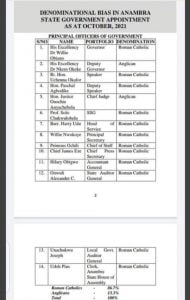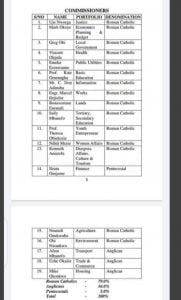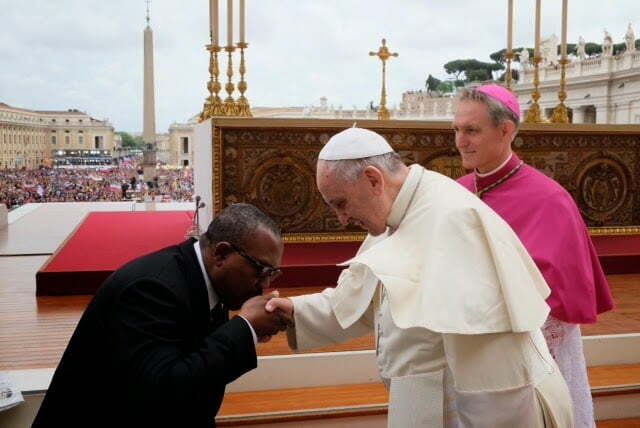In an attempt to pushback against his continuous association with the Indigenous People of Biafra (IPOB), the tribal and violent secessionist group spreading terror in the eastern region of the country, Labour Party’s candidate Peter Obi has repeated a vow to govern the incredibly diverse country fairly and as a united nation. But a foray into his previous stint in public office as the governor of Anambra provides little evidence of either the candidate’s capacity or will to do this.
As the elected leader of Anambra State between 2007 and 2014, Obi turned to divisive tactics that exacerbated social tensions and cleaved the state into two contending religious camps of Roman Catholics and Anglicans, records show. It was a spectacular and troubling example of how social fissures can manifest and take root in a seemingly homogenous society, and how unprincipled political actors can feed tensions and exploit the conflict to shore up their power.
Obi, a Roman Catholic, packed his government with members of his faith who constitute the majority and made no secret his aim to keep the position by offering nepotistic privileges to the group, even at the expense of social harmony. He was a strong ‘divide and rule’ adherent, many reasoned.
Whilst the formation of government cabinets historically follows broader social patterns to achieve equitable representation of all resident social groups, Obi bucked the trend as Governor with a disproportionate appointment of Catholics, revealing what was widely criticized as thinly-veiled bigotry and arbitrary tribal preference that heightened social tensions and caused lasting damage to the state’s politics.
He was also reported at the dawn of his tenure to have encouraged Catholics in Anambra to “maintain their grip on the state” and demonstrate their renewed and strengthened dominance under his watch by electing another Catholic as his successor. The speech expectedly sparked fury and made the election a referendum on religious power and dominance, perhaps to deflect attention from his performance and objective scrutiny of his preferred successor. Unsurprisingly, the beneficiary of the divisive, scorched earth campaign, maintained the exclusionary and tribal status quo.


Obi’s undesirable record in this regard sharply contrasts that of one of his opponents who equally served an eight-year term as Governor. APC’s Bola Tinubu was the governor of Lagos State between 1999 and 2007.
Unlike Obi who favored clannishness and divided his people along religious lines, Tinubu won applause as a ‘detribalized, results-driven’ governor whose leadership saw the assemblage of diverse and highly-competent individuals, many of whom were sourced from the private sector without consideration for immaterial factors such as religion and ethnicity and have gone on to occupy senior positions in the Federal Government.
Examples include Arthur Worrey from Delta State, Ben Akabueze from Anambra State, Yemi Osinbajo and Wale Edun from Ogun State, Lai Mohammed from Oyo State, and Rauf Aregbesola from Osun State. It’s an impressive list that parades a sitting Vice President, Ministers, and ex-governors.
This focus on competence and responsible management of social relationships in a state that is the choice destination of local migrants from across the country, formed a key pillar of Tinubu’s highly successful tenure and laid the foundation for the elevation of non-Yorubas in the state, many of whom occupy senior government cabinet positions, legislative seats, and heads of agencies.
His running mate, Senator Kashim Shettima, boasts of a similar record. As governor, he displayed an unprecedented commitment to Nigeria’s diversity and set a glowing example of inclusion, tolerance, and national unity. His appointees from states other than Borno include:
- Isa Gusau, Special Adviser, Media & Strategy (Zamfara)
- Kester Ogualili, SA, inter-community relations (Anambra)
- Usman Majidadi Kumo, SSA, Radio (Gombe)
- Christopher Godwin Akaba, SSA, Special Duties (Delta)
- Ahmed Ishaq Ningi SSA, New Media (Bauchi)
- Lanre Obadiah, SA, Social Investment (Kwara)
- Victor Izekor, SA, Social investment (Abia)
- Jack Vicent, SSA, Social investment (Benue)
The sharp contrast with the clannish Obi has not gone unnoticed. Although Obi and his supporters have largely adopted fear-mongering tactics over what they described as the Muslim-Muslim nature of the APC ticket, non-Catholic residents of the Eastern region and other Nigerians – particularly northerners who have documented their unfair treatment, loss of properties and summary ‘deportation’ by the Obi-administration in Anambra – have maintained that Tinubu’s promise of equity and fairness is far more convincing, given his records, than Obi’s lip service.

